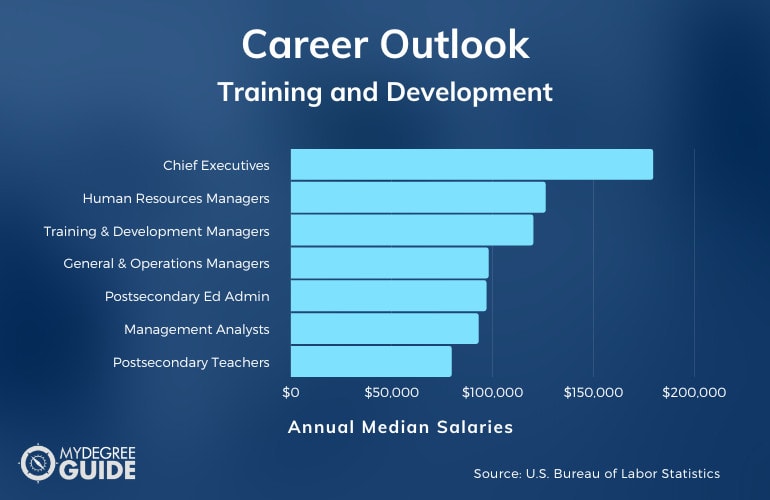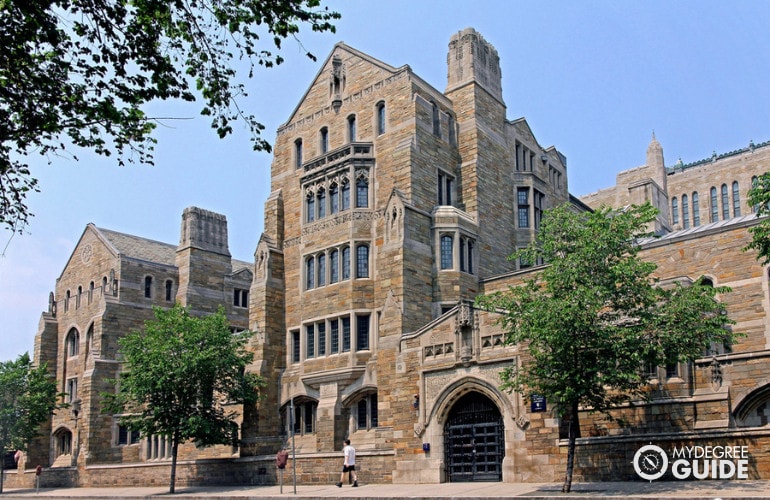A PhD in Training and Development helps you develop your expertise in driving high performance and positive change in both individuals and organizations.

This program combines adult learning, organizational leadership, and human resource development, so graduates are often well equipped to take on high-level roles. Every industry needs training and development professionals, especially as continuous learning becomes the norm.
Editorial Listing ShortCode:
With a PhD, you can advance your career further, produce original research, and gain expertise in a field that’s increasingly in-demand for organizations of all types.
Universities Offering Online PhD in Training and Development Degree Program
Methodology: The following school list is in alphabetical order. To be included, a college or university must be regionally accredited and offer degree programs online or in a hybrid format.
Baylor University
Baylor University offers an EdD in Learning and Organizational Change. The program requires 54 credit hours and typically takes 3 years to complete. It is mostly online but does include two immersions. Online courses are designed to be flexible but still interactive. Applicants do not need to have master’s degrees or GRE or GMAT scores.
Baylor University is accredited by the Southern Association of Colleges and Schools Commission on Colleges.
Colorado State University
Colorado State University offers an online program for a PhD in Organizational Learning, Performance, and Change. The program requires 60 credits to graduate, and most students can finish within 4 years. Coursework includes Workforce Development, Scenario Planning in Organizations, Theory Building in Applied Disciplines, and more.
Colorado State University is accredited by the Higher Learning Commission.
Kansas State University
Kansas State University offers a Doctorate in Adult Learning and Leadership. This hybrid online and in-person program requires 90 credit hours. Courses are 8 to 14 weeks long. There are two specific courses that must be completed on campus, but they are offered during the summer.
Kansas State University is accredited by the Higher Learning Commission.
Louisiana State University – Shreveport
Louisiana State University—Shreveport offers an online program for a Doctor of Education in Leadership Studies. Concentrations are available in Leadership Studies, Disaster Preparedness and Emergency Management, and Health Communication and Leadership. The program requires 63 credit hours, and multiple start dates are available each year. Courses are taught by faculty with real-world experience.
Louisiana State University – Shreveport is accredited by the Southern Association of Colleges and Schools Commission on Colleges.
Northwestern State University of Louisiana
Northwestern State University of Louisiana offers an online program for a Doctor of Education in Adult Learning and Development. Students can choose a concentration in Community College Leadership or Adult Learning and Workforce Development. During the fall and spring, Northwestern offers 8 week, fast-track classes.
Northwestern State University of Louisiana is accredited by the Southern Association of Colleges and Schools Commission on Colleges.
Rivier University
Rivier University offers an online program for an EdD in Leadership and Learning. The program requires 51 credit hours and usually takes 3 years to complete. Each course is 7 weeks long, with a total of six terms per year. Students can begin work on their dissertations during their first year. The program is intended for working professionals.
Rivier is accredited by the New England Commission of Higher Education.
University of Illinois – Urbana Champaign
The University of Illinois—Urbana Champaign offers a Doctor of Education in Education Policy, Organization, and Leadership. Students in the program can choose from a variety of concentrations, including Diversity and Equity in Education, Global Studies in Education, Human Resource Development, and more.
The University of Illinois – Urbana Champaign is accredited by the Higher Learning Commission.
University of North Texas
The University of North Texas offers a Doctor of Philosophy in Learning Technologies. The program is available both on campus and online. Online students are required to attend an annual in-person meeting in the fall but can otherwise complete requirements from anywhere on their own schedule. For both online and on-campus students, new cohorts begin every fall.
The University of North Texas is accredited by the Southern Association of Colleges and Schools Commission on Colleges.
Vanderbilt University
Vanderbilt University offers a Doctor of Education in Leadership and Learning in Organizations. The program is intended for mid-career professionals. Online classes meet weekly via webcam. Students must complete 54 credit hours and a capstone project to graduate. Courses include Leading Inclusive Organizations, Economics of Human Resources, and Data Science.
Vanderbilt University is accredited by the Southern Association of Colleges and Schools Commission on Colleges.
Walden University
Walden University offers a Doctor of Education in Organizational Leadership and Development. The program is mostly online but does include one academic residency. Coursework includes Leading the Future of Education, Tools for Doctoral Research Success, Organizational Decision Making and Judgment, Qualitative Reasoning and Analysis, and more.
Walden University is accredited by the Higher Learning Commission.
Online PhD in Training and Development Degree Programs

An online PhD in Training and Development is an intensive doctoral program that studies both human and organizational behavior. Ultimately, training and development aims to empower people by enhancing their knowledge and skills, which often leads to professional growth and positive results for their organizations.
Students of this PhD program are required to be working professionals with at least a few years of experience in the field. The program does involve plenty of research, but the focus is on applying theories and findings to create evidence-based solutions for workplace challenges.
Training and development PhD programs are offered in several concentrations, such as global training and development, organizational development, adult learning, and human resource development. Here are some topics that this type of program might tackle:
- Cultural diversity in the workplace
- Optimizing performance using technology
- Effective methods for adult learning
- Adapting training programs for a global workforce
- Creating a healthy company culture
- Implementing efficient management processes
- Addressing complex leadership dilemmas
During the first part of this doctoral program, you’ll take advanced coursework in human resource development, adult learning, career development, and other foundational topics.
Since organizations today are diverse, you can examine real-life challenges across all sorts of settings, including corporate companies, global corporations, startups, and government agencies. Much of your PhD will likely be spent working on a dissertation, where you’ll be supervised by professors with the same research interests.
As preparation for your dissertation, you’ll take several courses on research design for the social sciences as well as qualitative and quantitative research methods. Since you’ll be producing your own original research, you can effectively become a specialist in the training and development field by the time you finish your PhD.
A PhD in Training and Development can be adaptable to your career goals because you’ll have plenty of freedom to decide on your research interests. Graduates typically lead training and development initiatives in companies, work in management positions, or provide organizational consulting. Others may teach in universities or mentor executives and other professionals in taking their performance to the next level.
Common Doctorate in Training and Development Specializations

Since training and development is a broad field, doctorate in learning and development degrees offer various specializations, such as:
- Human Resources Development. One of the most common PhD specializations, human resources development is all about training and motivating employees to improve their productivity, abilities, and knowledge. This involves practices like mentoring, coaching, online courses, tuition assistance, and workshops. The end goal is to promote growth in both employees and the organization as a whole.
- Organizational Development. With an organizational development PhD program, you’ll specialize in managing and refining the processes of an entire organization. Human resource development is one part of this. It also includes making overall communication more seamless, coming up with more innovative and effective products, and removing unnecessary expenses.
- Adult Learning and Development. Adult learning and development puts more emphasis on education, with graduates becoming experts in promoting learning in business organizations, nonprofits, and schools. You’ll delve into various theories of adult education, take into account different learning styles, and apply strategies like project-based learning.
- Organizational Leadership. An organizational leadership PhD will train you in how to take charge of an organization effectively, from deciding on major strategic goals to bringing out the strengths of employees. It’s mainly a business degree that takes into account psychology and sociology. You’ll get familiar with leadership tools and approaches for different workplace situations.
- Global Training and Development. Because more organizations are going global, a PhD specializing in global training and development can teach you how to develop employees and teams with diverse languages, cultures, and perspectives. For example, this could mean using several modes of delivery for trainings and making correct translations to avoid cultural misunderstandings.
There is some overlap among these specializations, so whichever you choose, you’ll still likely take courses in instructional design, career development, and other core topics.
Training and Development Careers & Salaries

A PhD in Training and Development is the highest academic credential in the field, so it can open up opportunities for you to pursue more advanced positions.
For one, many PhD students come from a human resources (HR) background. Because of the intensive coursework, they may become HR managers or training and development managers who supervise staff, lead employee programs, and provide mentoring and coaching.
A training and development doctoral program can help prepare you for management roles in general. After all, you can gain a deeper understanding of how to drive organizational change while helping people achieve their professional goals. Some graduates work in business and organizational analysis, where they analyze organizational structures and challenges and develop solutions.
According to the Bureau of Labor Statistics, here are some careers related to training and development.
| Careers | Annual Median Salaries |
| Chief Executives | $179,520 |
| Human Resources Managers | $126,230 |
| Training and Development Managers | $120,130 |
| General and Operations Managers | $97,970 |
| Postsecondary Education Administrators | $96,910 |
| Management Analysts | $93,000 |
| Postsecondary Teachers | $79,640 |
| Instructional Coordinators | $63,740 |
| Human Resource Specialists | $62,290 |
| Training and Development Specialists | $61,570 |
Beyond high-ranking positions in an organization, another option for PhD graduates is consultancy. Some graduates become management consultants or learning and development consultants who develop training programs for various companies. They could specialize in corporate training as well and hold workshops and courses on career and personal growth.
With further training, PhD graduates may opt to go into executive, performance, or leadership coaching. This allows them to work with a wide range of individuals, from CEOs to people starting out in their careers. Since a PhD gives plenty of exposure to research, graduates may join the academe as professors and scholars who conduct their own studies.
It’s actually common for graduates to combine several careers. For example, a training and development professional may become a professor, executive coach, and training consultant.
Training and Development PhD Curriculum & Courses

When earning a PhD in Training and Development, you’ll likely come across these courses:
- Foundations of Human Resource Development: This course studies how to train, nurture, and manage employees so they can hone their skills and make a positive impact on their organization.
- Adult Learning: You’ll examine the factors that affect adult learning—including motivation and developmental challenges—with the goal of creating effective educational programs for adults.
- Theory and Practices of Leadership: This course looks at the core elements of leadership—including innovation, ethics, and team-building—and how these play out in actual work situations through case studies.
- Career Development: You’ll learn how to promote career growth for individuals and teams by assessing personal strengths and weaknesses, pinpointing marketable skills, and making a customized plan.
- Instructional Design: This course teaches you how to prepare effective learning resources, following a systematic process where you’ll make prototypes and gather feedback.
- Organization Theory and Design: You’ll examine the social structures of organizations and look at the most common forms of modern organizations, covering topics like decision-making, culture, and power.
- Program Planning and Evaluation: This course goes over the process of designing a training program, from gathering information to developing program steps and measuring outcomes.
- Educational Statistics: You’ll work with methods of inquiry for educational research, including doing hypothesis testing and applying inferential techniques like T-tests.
- Quantitative Research: This in-depth course teaches you how to conduct your own research by using the right quantitative methods and working with data analysis software.
- Qualitative Research: You’ll get to practice handling qualitative data, with methods like field interviews, ethnography, document studies, field observations, and focus-group discussions.
You’ll likely go through most of these courses during your first year, after which you may devote much of your time to your dissertation.
How to Know If a Doctorate in Training and Development Is Right for Me

A doctorate in training and development often appeals to those who would like to advance their careers in management, organizational planning, education, and human resources. A doctorate in training and development might be right for you if you have the following:
- Passion. You have a passion for teaching or mentoring people and helping them grow professionally.
- Curiosity. You’re fascinated with how organizations achieve success along with what makes people tick.
- Experience. You already have some related experience with training and development, whether you’ve studied it formally or it’s part of your professional life.
- Career drive. You want to build a long-term career focused on improving the performance and efficiency of both organizations and people.
- Interest in research. You’re interested in conducting in-depth research and learning about academic theories in adult learning, organizational development, and leadership.
- Time. You have the time and the resources to work on a PhD for several years.
Training and development is held in high importance today in most organizations, and a PhD shows that you have expertise in this topic and can contribute original insights.
Admissions Requirements

Admissions for a PhD in Training and Development tend to be rigorous, with requirements such as:
- Official transcripts. These cover all of the courses you’ve taken at the college and postgraduate level.
- Recommendation letters. You’ll may submit letters from managers at work and previous professors.
- Resume. Most programs expect you to have related work experiences, extracurriculars, and education.
- Personal essay. You’ll likely explain your background, career, and research interests.
Schools with a more traditional admissions process may ask for GRE or GMAT scores too.
Accreditation

Getting a PhD in Training and Development takes plenty of dedication, so it’s strategic to choose a reputable school that’s regionally accredited.
For a school to receive regional accreditation, it has to be reviewed thoroughly by external accrediting organizations, and it’s evaluated based on high educational standards. A PhD from an accredited school will often make a stronger impression on future employers. If you’re planning to work in the academe, many universities only credit PhDs from accredited schools. Studying at an accredited school will also allow you to apply for federal financial aid.
You can verify the accreditation status of prospective schools by visiting the Council for Higher Education Accreditation (CHEA) online.
Financial Aid and Scholarships

Applying for financial aid can significantly lighten the expenses of doctoral students who qualify. Many PhD programs offer funding to students, with some programs giving full scholarships with stipend once you’re admitted. These PhD programs tend to be more competitive, though.
Alternatively, you might be able to find scholarships from external sources, especially if you have strong academic credentials and a good track record in your field. Some employers even offer financial assistance to workers who are advancing their education.
You can also look into assistantships and fellowships. Many PhD programs allow you to do research or teaching assistantships while studying. Fellowships may be available, too, but these often give you funding for 1 year or less. To apply for federal aid, you can fill out the Free Application for Federal Student Aid (FAFSA). Your FASFA can determine your eligibility for federal student loans, grants, and work-study programs.
Training and Development Professional Organizations

Since training and development is a highly collaborative field, you can benefit from joining professional organizations to expand your network and access more career opportunities.
Here are three major professional organizations for training and development specialists:
- Association for Talent Development (ATD)
- International Society for Performance Improvement (ISPI)
- Quality Matters Instructional Designers Association (QM IDA)
These organizations have multiple branches across the country, with thousands of members in total. By joining, you could receive event invites, trainings, and up-to-date industry resources.
What Is Training and Development?

Training and development is the process of providing education to employees so they can sharpen their skills and increase their job performance within an organization.
It’s usually coordinated by an organization’s human resources department, with initiatives ranging from one-day workshops to regular mentoring and coaching. Training and development can target a variety of skills, including hard skills like data analysis or strategic planning as well as soft skills like communication and empathy.
Programs can be delivered in different formats, such as online learning, in-person lectures, group discussions, and on-the-job training.
Is Training and Development a Good Career?
Yes, training and development is a good career for many professionals. Because the work world has become very dynamic and fast-paced, organizations are investing more in training and development so their employees can adapt.
This opens up demand for training and development experts. Aside from leading in-house teams, they might work in management, coaching, or business consulting—all of which are fields with many highly paid jobs. At the same time, this career can be fulfilling if you enjoy helping people directly and making a significant contribution to an organization.
What Can You Do with a Doctoral Degree in Training and Development?
A PhD in Training and Development may help you advance in your current career as well as open up new career paths for you. It can prepare you to become a thought leader in your field, whether as an academic researcher or as an organizational consultant who can provide high-level advice to companies.
Possible career paths include human resource management, training and development management, and organizational planning. Some experts become executive coaches or trainers who conduct one-on-one sessions for professionals or group workshops for companies.
What Does a Training and Development Specialist Do?

A training and development specialist plans, creates, and evaluates training programs and materials, usually for employees of an organization.
Training programs tend to be diverse, with formats such as orientation sessions, negotiation workshops, team-building activities, and consultations with executives. It’s a fairly involved job because training and development specialists handle the entire process.
In addition to doing surveys and interviews to design a good training program, they may either teach the program themselves or supervise instructors. Afterwards, they’ll also assess results and gather feedback.
How Long Does It Take to Get a PhD in Training and Development Online?

Most PhD programs in training and development require around 60 credits or less. This is actually a bit shorter compared to other PhDs, which can reach up to 120 credits. A PhD can typically be completed in 3 to 5 years with full-time study.
If no dissertation is required, a PhD can often be completed in 3 years with full-time enrollment. It’s traditional for PhD students to study full-time. Since more online PhDs are available, though, and many training and development specialists prefer to stay active in their careers while studying, some programs may allow for part-time enrollment. This is also the case with many online masters in training and development programs.
Is a PhD in Training and Development Worth It?

Yes, a PhD in Training and Development is worth it for many students. A PhD is a well-respected credential that shows you’re an authority in your field. This could help you qualify for leadership or high-level management roles. PhD holders have the highest median wage compared to other education levels, according to the Bureau of Labor Statistics.
Training and development is also a thriving field that’s estimated to grow faster than average. For instance, the Bureau of Labor Statistics projects 11% job growth for training and development specialists and managers over the next ten years.
A PhD program can enable you to develop specialized expertise. Having high levels of industry knowledge and a deep understanding of learning principles can help you stand out in this growing field.
Getting Your PhD in Training and Development Online

If you love solving organizational challenges and empowering people to achieve their goals, then you might consider getting a PhD in Training and Development to enhance your career.
A PhD can train you in rigorous, evidence-based approaches and allow you to make your own mark in the field. As a working professional, you might find it even more convenient to earn your PhD online.
If you’re ready to advance your expertise with a PhD in Training and Development, you can start exploring doctoral programs from accredited schools today.
